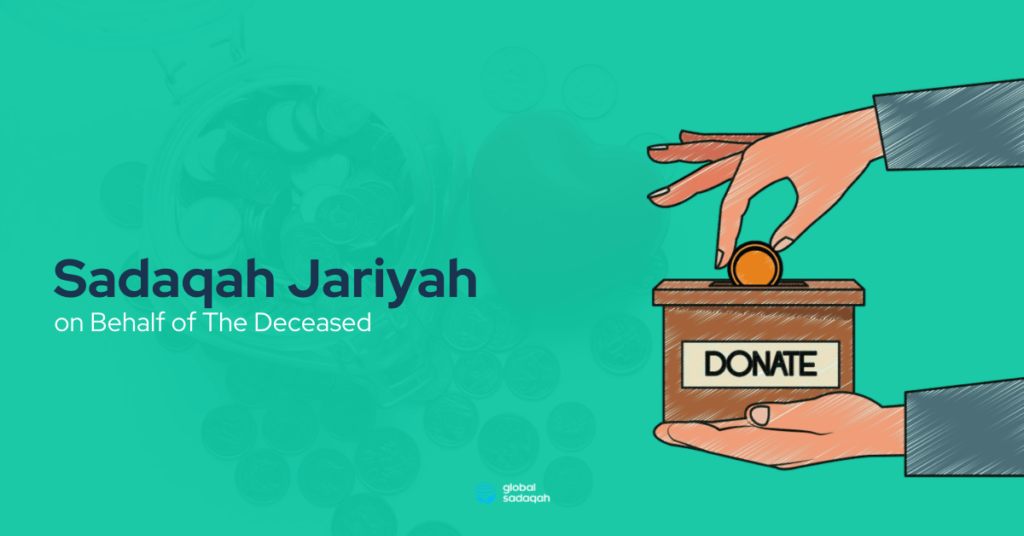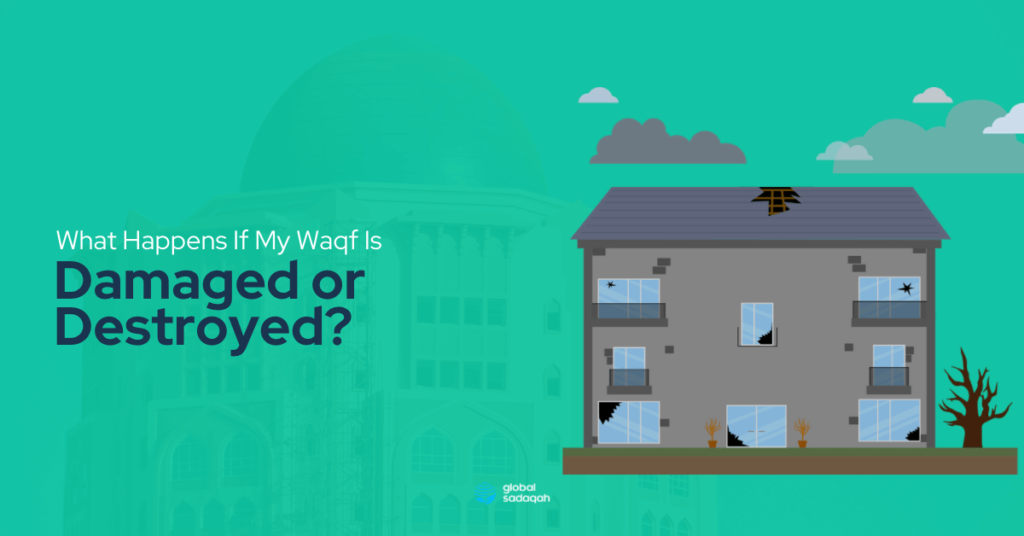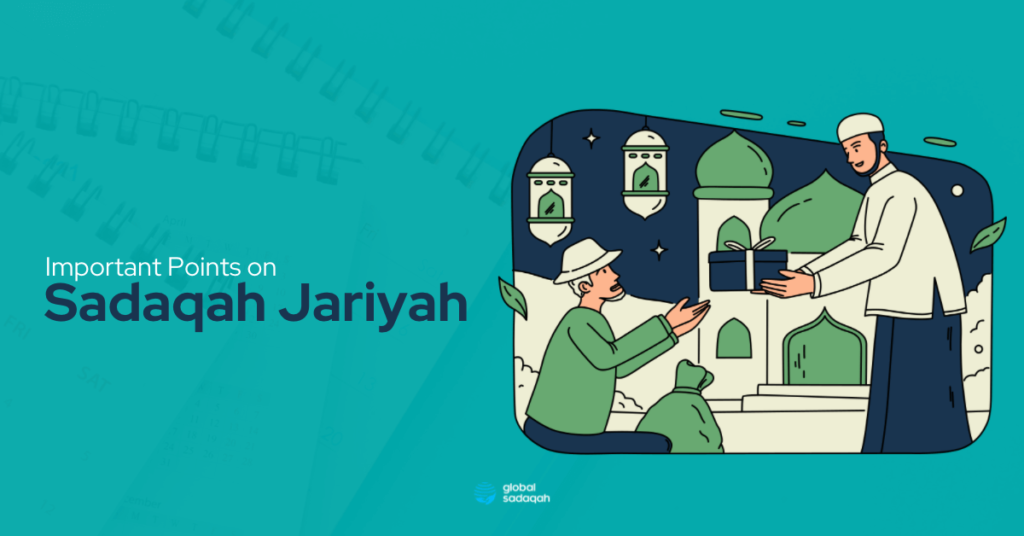Imam Ibn Al-Qayyim رحمه الله said, “If the one giving charity knew that his charity falls in the hand of Allah before the hand of the poor, the delight of the one giving would be more than the delight of the one taking.” [Madarij al-Salikeen 1/26]
On the authority of Abu Hurairah, the Messenger of Allah said, ‘When a person dies, his deeds come to an end except for three: Sadaqah Jariyah (a continuous charity), or knowledge from which benefit is gained, or a righteous child who prays for him’. [Muslim]
Commenting on this in his commentary of Sahih Muslim, Imam al-Nawawi رحمه الله wrote, “Ongoing charity (sadaqah jariyah) is a type of waqf (endowment).”
In another hadith, the Prophet ﷺ said: “The righteous deeds that continue to benefit a believer after his death include the knowledge that he teaches and spreads among others; a righteous son whom he leaves behind; or a copy of the Quran that he bequeaths to his inheritors; or a masjid that he builds; or a rest house that he builds for the wayfarers; or a canal of water that he digs for the benefit of others; or a charity that he gives out of his property during his life while he is in sound health. He will continue to receive a reward for all these even after his death.” [Ibn Maajah and Ibn Khuzaymah]
Sadaqah jariyah or continuous charity means the charity whose reward continues for its donor and it is recorded in his good deeds even after his death. Normal sadaqah on the other hand benefits the donor on a single occasion and is recorded as one good deed depending on the intention and Allah can multiply it much further InshaAllah.
The virtues of such deeds lie in the reward which continues even after the death of the person; it does not cease at his death. The degree of reward is not similar for all the deeds; rather, it varies from one act of charity to another based on its type, effects and the need of people for that charity.
Add to this, Allah is the King of Kings and His Bounty is Limitless. In a very famous narration, it is reported that the people slaughtered a sheep at the time of the Prophet ﷺ and gave it in charity except for its shoulder. The Prophet ﷺ asked ‘Aishah, “What is left of it?” She said: “Nothing is left except the shoulder.” He said: “All of it will remain except its shoulder.” [Tirmidhi]
What this means is that whatever a person eats is that which is gone and no longer remains, but that which he gives in charity is what will remain for him with Allah and he will benefit from it on the Day of Resurrection. This hadeeth is a reference to the verse in which Allah says,
“Whatever is with you, will be exhausted, and whatever is with Allaah (of good deeds) will remain” [al-Nahl 16:96]
Sadaqah Jariyah on Behalf of The Deceased

The scholars unanimously agree that it is permissible to give charity on behalf of the deceased and that its rewards will reach them. The deceased benefits from the continuous charity (charity which has a continuous benefit) whether it was donated for him, his children, his wife, or by any other strange person (a non-relative).
Imam Muslim رحمه الله stated in the introduction of his Sahih that Imam Ibn al-Mubarak رحمه الله said: “There is no difference of opinion about charity (that it reaches the dead).”
Imam Muslim actually titled a section of his Sahih as “The Reward of Charity on Behalf of the Deceased Reaches Him.”
On the authority of Sa‘d bin ’Ubadah that he said, ‘O Messenger of Allah! Umm Sa‘d has died, so which charity is best?’ He replied, “Water (is best).” He said, ‘So he (Sa’d) dug a well and said, “This (well) is for Umm Sa‘d”’. [Abu Dawud]
It was narrated from Sa’d ibn ‘Ubaadah that his mother died when he was absent, and he said: “O Messenger of Allaah, my mother has died when I was absent. Will it benefit her if I give in charity on her behalf?” He said: “Yes.” He said: “I ask you to bear witness that my garden that bears fruit is given in charity on her behalf.” [Bukhari]
It was narrated from Aishah that a man said to the Prophet ﷺ: “My mother died suddenly and she did not leave a will, but I think that if she could have spoken she would have given in charity. Will she have a reward if I give in charity on her behalf?” The Prophet ﷺ said: “Yes.” [Bukhari and Muslim]
Abu Huraira reported: A man said to the Prophet ﷺ, “My father has died and he left behind some property without drafting a will for it. Will his sin be expiated if I give charity on his behalf?” The Prophet ﷺ said, “Yes.” [Muslim]
Imam Musa al-Hajjaawi رحمه الله said: ‘Any act of obedience (by which one gets nearer to Allaah) that one does on behalf of a dead Muslim or a live one will benefit him (the dead or the live person).’ Imam Ahmad further said: ‘The reward of any good act that one performs on behalf of a dead person will reach him.’
Imam Abu Bakr al-Khallal رحمه الله, mentions in his work, “Commanding the Good and Forbidding the Evil,” that Imam Ahmad once entered a graveyard with some of his students and saw a blind man sit at a grave to recite Qur’an. Imam Ahmad told him to stop since he considered it a reprehensible innovation (bid`ah). When they left the graveyard, one of his students narrated a hadith with a sound chain of narration that Ibn Umar himself left a bequest that someone should recite Qur’an at his grave after his demise. Upon hearing the narration, Imam Ahmad told the student to return and tell the blind man to go ahead and recite Qur’an. [Muhammad Awwamah, Athar al-Hadith al-Sharif, citing Ibn Qayyim, Kitab al-Ruh]
Imam Muḥammad b. Aḥmad al-Marwazi رحمه الله said, “I heard Ahmad say, ‘If you enter the graveyard, recite Ayat al-Kursi, ‘Qul HuwAllahu Aḥad’ three times, and then say, ‘O Allāh, its virtue is for the dwellers of the graves!’’” [al-Ṭabaqat, 2/1228].
Imam al-Muwaffaq رحمه الله said, “Any act of devotion done to give the reward to a deceased Muslim will benefit them, InshaAllah. I do not know of any difference of opinion regarding supplication, seeking forgiveness, voluntary charity, and the performance of obligations in which a proxy is acceptable. Allāh has stated (what means), ‘And those who come after them will pray, ‘Our Lord! Forgive us and our fellow believers who preceded us in faith…’’ and ‘And seek forgiveness for your shortcomings and for the sins of the believing men and women’” [al-Mughni 2/225].
Imam al-Mardawi رحمه الله stated “al-Marwazi has reported, ‘If you enter the graveyard, recite Ayat al-Kursi, ‘Qul HuwAllahu Aḥad’ three times, and then say, ‘O Allāh, its virtue is for the dwellers of the graves’, meaning the reward’” [al-Insaf, 7/152].
Imam al-Buhuti رحمه الله said, “Every act of devotion performed by a Muslim and then dedicated totally or partially e.g., half, a third, a fourth of the reward, to a living or deceased Muslim is permissible and will benefit them. The reward will be conferred upon them, even upon the Messenger of Allāh as mentioned by al-Majd. This includes both voluntary and obligatory deeds, be they deeds for which a proxy is acceptable such as Ḥajj and the likes such as an oath-fast or deeds for which a proxy is unacceptable like prayer, supplication, seeking forgiveness, charity, manumission, uḍḥiyah, paying a debt, fasting, recitation, etc. Aḥmad said, ‘Everything good reaches the deceased. This is based on supporting texts and the fact that the Muslims everywhere gather to recite and gift their deceased without repudiation; it is consensus’” [Kashshaf al-Qinaʿ 4/431].
Imam al-Taqi b. Taymiyyah said, “Regarding the reward of recitation and charity along with other acts of piety. There is no contention between the scholars of al-Sunnah wa al-Jamaʿah about the reward of financial acts of devotion such as charity and manumission reaching the deceased as is the case with seeking forgiveness, praying the funeral prayer upon them, and supplicating for them at the grave. They did differ regarding the conferment of physical acts of worship such as fasting, prayer, and recitation. What is correct, however, is that they all reach the deceased because it has been authentically reported in al-Ṣaḥīḥayn that the Prophet said, ‘Whoever dies with outstanding fasts, their guardian is to fast on their behalf’ and ‘He ordered a woman whose mother died with outstanding fasts to fast on her behalf’” [al-Majmūʿ 24/366-367].
Sheikh Ibn Baaz رحمه الله said, “A deceased person is in need of supplication and charity (offered on his behalf), and the best thing a living person can do for the deceased person is to supplicate Allah, The Exalted, for him, implore Him to confer His mercy upon him, forgive and pardon him, and elevate his status in Paradise, and other similar good supplications. Charity benefits the deceased as well, be it in the form of money, food, clothes, or any type of property. All these acts benefit the deceased, as well as performing Hajj and ‘Umrah on his behalf. All of this benefits the deceased.”
Shaykh Salih al-Fawzan حفظه الله said, “The torment of the grave will cease, for the disobedient, but believing deceased one; if he should be tormented in his grave; by way of supplication or charity donated [on his behalf].”
What Happens If My Waqf Is Damaged or Destroyed?

Imam Ibn Qudamah al-Maqdisi رحمه الله said: “If a waqf is destroyed and nothing is left of it, it may be sold and the money used to buy something to be given back to the people in charge of the waqf, and it should be made a waqf like the first one was.
The same applies to a horse kept for jihad, if it is no longer fit for fighting, it should be sold and the money used to buy another one that is fit for jihad. What we conclude from this is that if a waqf is destroyed and is no longer of any use, such as a house that collapses or land that is ruined and becomes dead and no longer fit for cultivation, or a masjid from which the people move away, and is now in a place where people do not pray, or it becomes too small for the people and cannot accommodate them all, or it falls into disrepair, and it cannot be maintained except by selling part of it, then it is permissible to sell part of it in order to take care of the maintenance of the rest of it. If it is not possible to use any part of it, then the whole thing may be sold.
Imam Ahmad رحمه الله said, according to a report narrated by Abu Dawud: if there are two pieces of wood in the masjid which are of some value, it is permissible to sell them and spend the money raised on the masjid. According to a report narrated by Salih: the masjid may be removed to another location if there is the fear of it being robbed or if the location is in a filthy area. Al-Qaadi said: i.e., if that prevents people from praying there. And he stated that it is permissible to sell its courtyard, according to a report narrated by ‘Abdullah. The imam should give testimony to that effect (i.e., that these changes are necessary) [al-Mughni, 5/368]
Will My Rewards Cease If Waqf or Sadaqah Jariyah Ceases?

Firstly, we deal with the technical answer.
Our Sheikh Dr.Sajid Umar حفظه الله said, “The rewards for sadaqah jariyah lasts as long as the thing for which it was created lasts. The reward can be continuous only if the benefit is continuous. The rewards till the point where they benefit stopped as well as the rewards for establishing the sadaqah jariyah or waqf is safe with Allah. In this scenario, the sadaqah jariyah now becomes like a good deed that a person did which had a starting point and an ending point.
If we put a mushaf in the masjid, the person who kept it there gets rewarded as long as people read from it. If no one reads from it, even then the person is rewarded for having kept the mushaf there in the first place and this reward is safe with Allah.
If a person sponsors a hifdh student, and he eventually becomes a hafidh. He starts teaching other people the Quran, who then go forward and teach others. The rewards for the first student, and all the subsequent students who sprung up from him and all the benefit that they bring are in the account of those that sponsored the first student. This is why we need to realise how education is one of the most powerful forms of sadaqah jariyah. This is why it is said:
العلم النافع وقف لا ينقطع
“Beneficial knowledge is an endowment which doesn’t end”
Our Sheikh Bilal Ismail حفظه الله said, “The reward is dependent on the benefit derived for the community. If a person makes a well as a waqf, and then either the well is not taken care of, or the people near it move away, or the water dries up – the reward calculator stops because people are no longer benefitting from it. The term “Jariyah” in Sadaqah Jariyah linguistically refers to moving and technically it refers to a deed that is perpetual. Allah will reward a person till the time the benefit occurred as well as for establishing the sadaqah jariyah or waqf in the first place.”
Moving on, we can also look at it from a slightly different angle as was shared by Sheikh Dr. Ibrahim Nuhu. Sheikh Ibrahim حفظه الله said, “As long as someone is benefitting from it, the person will continue to get rewards for it. This is why it is called sadaqah jariyah. End of the day, it is very easy for Allah. Allah sees the intention of the person behind them setting up a well or something similar. The reward, we hope will be continuous for such a person.
Allah multiplies our charity for us till the Day of Judgement. Abu Huraira reported: The Messenger of Allah said, “None gives charity from what is good, for Allah only accepts what is good, except that the Merciful takes it with his right hand. Even if it is a date, it is nurtured in the hand of the Merciful until it becomes greater than a mountain, just as one of you nurtures his young horse or camel.” [Muslim]
If this is how Allah deals with our normal charity, then we can only imagine how Allah deals with, nurtures, and multiplies our larger charities like sadaqah jariyah, awqaf etc. They might be treated the same or better in the Court of Allah. I don’t want to say that the reward will be there if the benefit of the sadaqah jariyah stops, but we hope that because of the texts we have mentioned, the reward continues from Allah InshaAllah.”
Sheikh Saleh al-Fawzan narrates that he heard Sheikh Muhammad ibn Ibrahim رحمه الله say, “Verily, ongoing charity will end and the righteous child will die and the benefit of both of them will end. But beneficial knowledge will continue – so this is some of what distinguishes knowledge from other righteous actions.”
We conclude with a reminder from our Sheikh Ibrahim Nuhu حفظه الله, “ If a person is given a blessing and it is being misused by the servant, then Allah tests them with the opposite of it. You’re either on this side or that. Either you’re doing something important or not. Either you’re doing something that which please Allah, or that which pleases Shaitan. Check yourself.
Train yourself to give charity. It will help you and keep you away from and cut off spending it in the Haram manner. Wealth can take you to the highest station in Jannah or it can keep you way behind even the poorest of the poor where you have to account for every cent that you spent.
Don’t stop yourself from giving in the path of Allah. It will never reduce of what you have. That which you give will never be neglected by Allah. Allah will take care of it and make it grow for you. On the Day of Judgement you will see mountains of good and wonder where this came from.
The Prophet of Allah ﷺ was like the sea in his manner of charity. If you sit beside the sea, then sometimes it gives you fish, sometimes you find precious stones. Likewise with the Prophet ﷺ, no matter which direction you come to him in, you always leave with something from him. The Prophet ﷺ never said “La” in his life except for in tashahhud. This is ofcourse a metaphor of showing how charitable he was.

